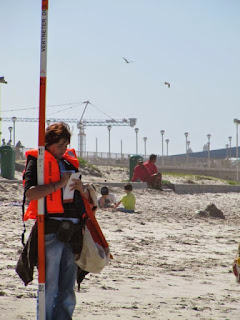Giving myself the space to write badly
(Photo Credit: James Reed)
As part of my research journey, I was lucky enough to spend the last week in March at a workshop called 'Navigating the Research Journey' which is run by CHED at UCT. I was able to attend even though I am at Wits, which was really very fortunate, as it helped clarify some of my research goals, and add my own voice to the mix. It's a workshop I would recommend to anybody who'd like to find his/her way through the research journey a little more clearly.
I wanted to go because I was feeling stuck when it came to my writing. I love research, I'll read pretty much anything I can find, and I enjoy learning from the participants. But condensing all that I've learned well enough to write it down can sometimes be a struggle. With my masters, I procrastinated, pretended I was busy, and then watched House MD in marathon box set runs, falling in love with the debates within episodes as much as the excuse it gave me to take time off.
Reading sends me into alternate worlds. I tend to withdraw for periods of time where I try to grasp new ideas. I read on the train, on the beach, wherever and whenever I get a chance. People I know start to ask if I am alright. I become very quiet. And I am more than alright. I am in that fascinating space where other people's ideas create new worlds, new understandings, and new connections to old material. I love this space. I'm willing to be patient with it. I'm aware that exploring new ideas often takes a lot of time. I am less patient with my own inability to explain them. I grow frustrated. I do other things. I worried that I might never finish my masters thesis.
This time, I was determined to be more proactive. When the old urge to procrastinate crept up on me, I'd already learned that the only way out is through. You have to start writing eventually. And so I thought I'd search for some assistance with writing. I was very grateful to learn that the grappling and struggling through questions or uncertainties is an important part of the process, and that the way to move forward was to write through it. The work didn't have to be 'right', just in process. I've learned that I can cut up my chaotic paragraphs, let parts of the work go, underline those sentences I most value and rebuild form there. I've also learned that when I'm stuck, it often helps to write what I feel. That way, the work doesn't feel as distant or detached, and I'm able to find my way through it.
I love my work, from the depths of my soul, but there are times when I really wish I'd taken some more English or Linguistics courses. There are times when I look at the writing the English graduates are able to produce, and I feel a jealous appreciation which leaves me yearning to do the same. Some days are better than others, but mostly I've learned that writing and re-writng is okay, and that you can't always get it right in one simple try.
A little while ago, I watched Elizabeth Gilbert on TED, speaking of the pressure writers sometimes feel to get it right, and the very individual responsibility modern writers have to take responsibility for their work. In the old times, she explains, people believed in a 'muse' or that being who came out of the walls to speak to the writer, helping him/her with the narrative. If your work was good, you had a great muse. If it was bad...not your responsibility. Gilbert then explained that on bad days, on those days when the muse does not speak to her, and she is left to slog it out alone, she realises that she is doing her part. She is there, working, and that perhaps this is enough.
I'm learning this too. Being there, at the computer, putting words onto the screen, sometimes has to be enough.
Labels: literature, me-search, Nicci Attfield, PhD research, PhD writing, procrastination, research writing


0 Comments:
Post a Comment
Subscribe to Post Comments [Atom]
<< Home